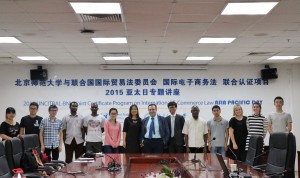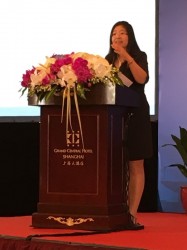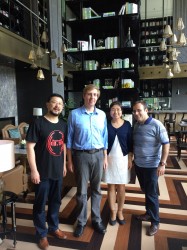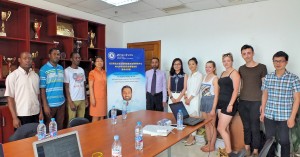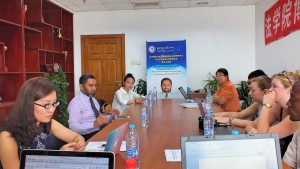Prof. Xue on APEC E-Commerce Business Alliance Expert Council
![IMG_1625[1]](http://wiki.iipl.org.cn/wp-content/uploads/2016/09/IMG_16251-300x225.jpg) The 6th APEC E-Commerce Business Alliance Forum was held on June 28-30, 2016, in Jinjiang, China. Prof. Xue, who was appointed on the Expert Council of the APEC E-Commerce Business Alliance, presented at the Forum on the International and Global e-Businesses and joined the Expert Council meeting. She was one of the primary drafters of the Jinjiang Proposal, a statement officially released at the Forum and later presented at APEC meetings.
The 6th APEC E-Commerce Business Alliance Forum was held on June 28-30, 2016, in Jinjiang, China. Prof. Xue, who was appointed on the Expert Council of the APEC E-Commerce Business Alliance, presented at the Forum on the International and Global e-Businesses and joined the Expert Council meeting. She was one of the primary drafters of the Jinjiang Proposal, a statement officially released at the Forum and later presented at APEC meetings.
In line with the theme “Promoting inclusive trade through cross-border E-Commerce “, the Forum explored the new development of cross-border E-Commerce for SMEs to participate in international trade in terms of opportunities, challenges and the future deeply and comprehensively, and how to ensure data privacy security issues in the era of big data, and discussed the impacts of developing cross-border E-Commerce on benefiting SMEs, driving a new round of global economic development and deepening the Asia-Pacific regional economic cooperation, so as to promoting stability, development and prosperity in Asia-Pacific region.
The Jinjiang Proposal made the following suggestions to global community:
For this purpose, our suggestions are as follows;
- To fully implement policy and business research advantages of the Alliance within its own field, actively explore practical ways and future prospect for small, medium and micro enterprises to participate in international trade and integrate into international value chain including obstacles which existing international trading system have on small, medium and micro enterprises integrate into international value chain, cross-border E-Commerce platform and environment, conditions and methods for small, medium and micro enterprises to develop cross-border e-commerce, to actively explore small, medium and micro enterprises innovation and entrepreneurship under the condition of Internet; to investigate innovation needs of each member country regulation mode regarding cross-border E-Commerce including the effective regulatory methods which the government and regulatory body have on flows of digital data and technologies, the protection which innovative systems and rules have on small ,medium and micro enterprises and the interests of consumers etc. These methods will promote and encourage small, medium and micro enterprises to participant in international trade through E-Commerce effectively.
- To actively promote each member’s government and industry organizations, try to form the rules for cross-border E-Commerce platform, establish cross-border E-Commerce credit verification system and markets for small, medium and micro enterprises in APEC region, to encourage cooperation and collaboration modes such as the Government and Enterprises ( PPP), platform and platform , reform international logistics practice, establish new international payment systems and credit rules in order for small, medium and micro enterprises to carry out cross-border E-Commerce.
- It recommends that all APEC governments and regulatory bodies allow for the development of industry standards for information technology and e-commerce that can be applied and observed equally by all SMEs throughout the APEC region. This will require that all relevant industry participants, especially SMEs, be allowed to participate in the process of developing these standards. The process could be organized and sponsored by the government agencies, but industry participants (including SMEs) should be allowed significant opportunity to present decisive input, and the process must be fair and transparent. The resulting industry standards must be acceptable and readily practicable throughout the APEC region not only applicable to certain entity. The result should be a network of e-commerce infrastructure that SMEs from any nation in APEC can access to participate and compete effectively in international trade throughout the region.
- To be active and efforts can be made into the following aspects;
a) To set up designative contacts system and information-sharing network within the APEC region, publish each economy entity’s updates , relevant policy, cooperation projects in the field of E-Commerce, and promote information exchange within all members, share E-Commerce development results and achievements;
b) To summarize the APEC region cross-border E-Commerce best practices and serve in exchanging visits between enterprises, business cooperation, technical support, investment and promote the development and progress for commercial and industry enterprises in the APEC region;
c) To emphasize and strengthen capacity-building in the field of E-Commerce and encourage capacity-building training activities, shorten the difference among the economies, and promote APEC economies complementary advantages for each other.
5. We are committed to continue to strengthen coordination and cooperation with other relevant international, regional cooperation organizations and forums, so that APEC E-Commerce Business Alliance would play a more important role in regional and global economic governance system.
Permalink Comments off

